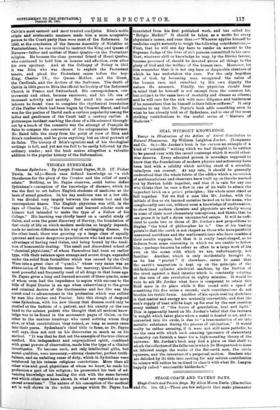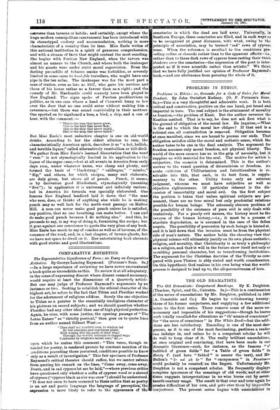converse than taverns or hotels ; and certainly, except where
the huge modern cosmopolitan caravanserai has been introduced with its stereotyped cookery and accommodation, nothing is more characteristic of a country than its inns. Miss Earle writes of this national institution in a spirit of generous comprehension, and with a stream of facts that might content the most exacting She begins with Puritan New England, when the tavern was almost an annexe to the Church, and where both the innkeeper and his guests were under strict moral supervision. Even the darling peccadillo of tobacco smoke was forbidden, or severely limited in some cases to bo,Lii fide travellers, who might have one pipe in the ten miles. The innkeeper was for the most part a man of station, even as late as 1817, who gave his services and those of his house rather as a favour than as a right ; and the comedy of Mr. Hardcastle could scarcely have been played in New England. The signs spoke of Puritan predilections in politics, as in one case where a head of Cromwell hung so low over the door that no one could enter without making him a reverence,—but there was sound conviviality in their mottoes One sported on its signboard a tree, a bird, a ship, and a can of beer, with the comment " This is the tree that never grew, This is the bird that never flew, This is the ship that never sailed, This is the mug that never failed."
But Miss Earle's most seductive chapter is one on old-world drinks. According to her the oldest allusion to rum, the characteristically American spirit, describes it as "a hot, hellish, and terrible liquor," called alternatively rumbullion or kill-divil. We gather from Miss Earle's learned dissertation that the word " rum " is not etymologically limited in its application to the liquor of the sugar-cane,—b ut at all events in America from early days rum, under whatever name, was cheap and plenty, and formed the basis of " blackstrap," " calibogus," " minibo," "flip," and others, for which recipes, many and elaborate, are duly given, bat above all of punch. Punch, it seems, is by derivation good Hindostani, etymologically (meaning "five"); in application it is universal and infinitely various ; but in America its formula was specially elaborated. One famous New England landlord laid it down that "the man who sees, does, or thinks of anything else while he is making punch may as well look for the north-west passage on Melton Hill. A man can never make good punch unless he is satisfied, nay positive, that no one breathing can make better. I can and do make good punch because I do nothing else." And this, he proceeds to say, is my way of doing it, furnishing the recipe; but it goes against our conscience to quote the very plum of any book. Miss Earle has much to say of coaches as well as of taverns, of the romance of the road, and, in a last chapter, of tavern-ghosts, but we have not space to dwell on it. Her entertaining book abounds with good stories and good illustrations.



















































 Previous page
Previous page